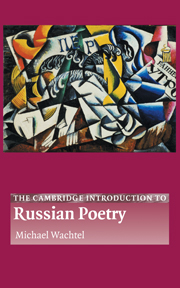Book contents
- Frontmatter
- Contents
- Preface
- Acknowledgments
- Note on translations and transliterations
- Introduction
- Part I Concepts
- Chapter 1 Versification: how to do things with words
- Chapter 2 Poetic language
- Chapter 3 Tradition and the individual talent
- Part II Interpretation
- Conclusion: poetry and pattern
- Bibliography
- Suggested further reading
- Index of poetic terms
- Index of names and works
Chapter 2 - Poetic language
Published online by Cambridge University Press: 05 June 2012
- Frontmatter
- Contents
- Preface
- Acknowledgments
- Note on translations and transliterations
- Introduction
- Part I Concepts
- Chapter 1 Versification: how to do things with words
- Chapter 2 Poetic language
- Chapter 3 Tradition and the individual talent
- Part II Interpretation
- Conclusion: poetry and pattern
- Bibliography
- Suggested further reading
- Index of poetic terms
- Index of names and works
Summary
По́шло сло́во любо́вь, ты права́.
Я приду́маю кли́чку ину́ю.
Для тебя́ я весь ми́р, все слова́,
Если хо́чешь, переимену́ю.
Пастернак, «Без назва́ния»You are right, the word ‘love’ is banal.
I will think up another term.
For you, if you like,
I'll rename the whole world, all the words.
Pasternak, “Without a Name”In poetry, as in any other kind of speech, our specific words reveal an enormous amount about us. All languages are rich enough to offer multiple ways of expressing the same sentiment. The poet, it has been claimed, chooses “the best words in the best order.” But what are the “best words”? Since there is no litmus test to determine whether a given word is worthy or unworthy, poets must determine for themselves what vocabulary is appropriate for what work. The results vary widely, depending on the era, the genre, and the personal taste of the individual.
Lexicon
With the advent of secular poetry in Russia, the need for a distinct poetic language became imperative. One of Lomonosov's seminal ideas was to apply the classical notion of three styles (high, middle, low) to the Russian literary language. Since Lomonosov felt that poetic language should be maximally differentiated from spoken language, he gave pride of place to the high style, which was based on words borrowed from Church Slavonic (the Russian recension of Old Church Slavonic, a written language devised in the ninth century in order to translate liturgical texts from Greek).
- Type
- Chapter
- Information
- The Cambridge Introduction to Russian Poetry , pp. 35 - 49Publisher: Cambridge University PressPrint publication year: 2004

